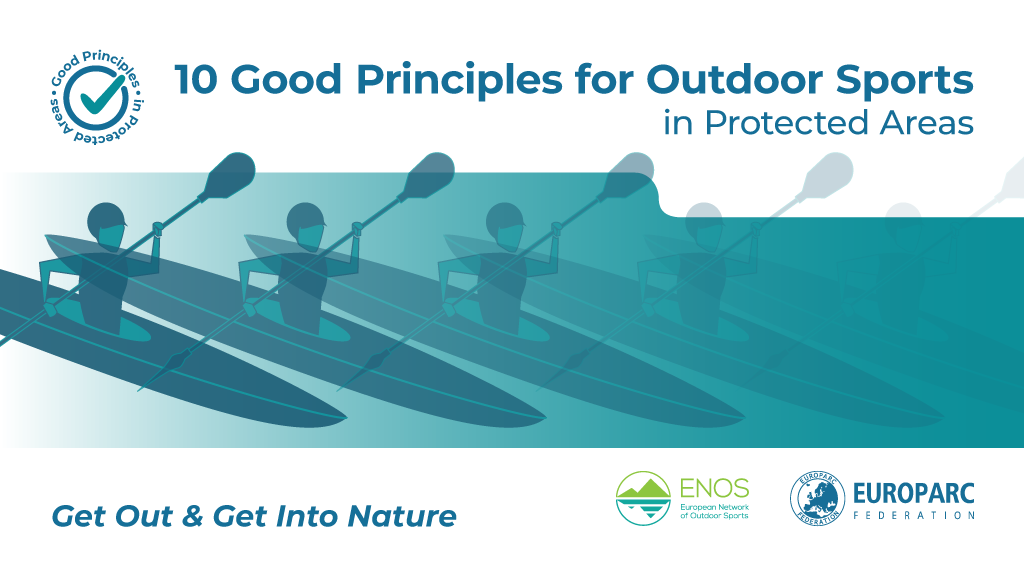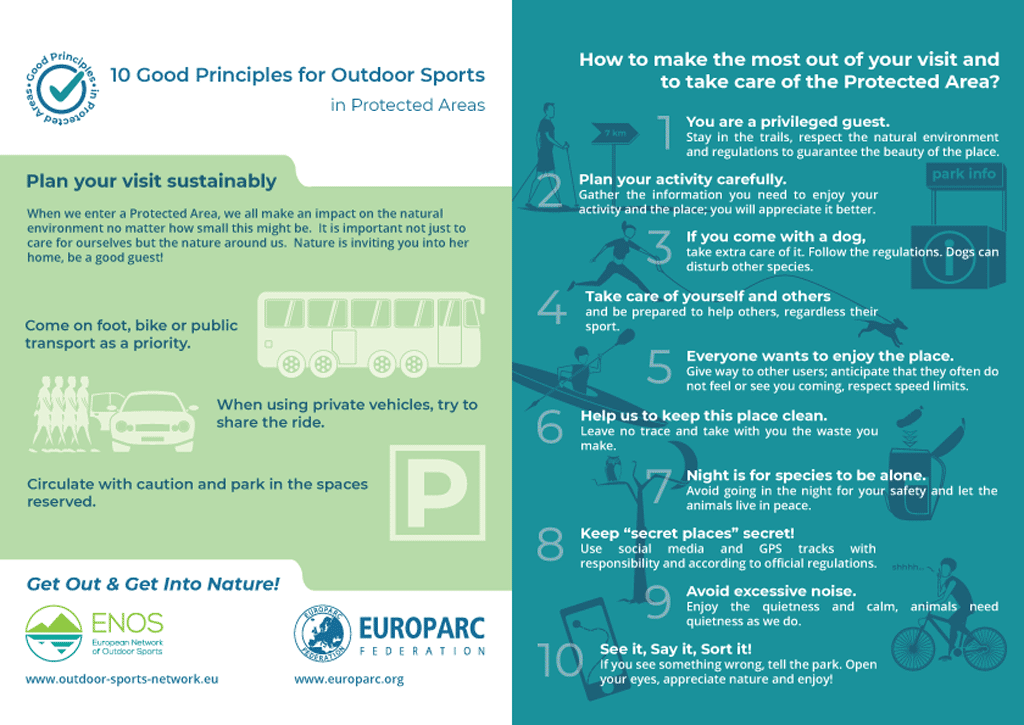On the occasion of the 2019 European Week of Sports, the European Network of Outdoor Sports (ENOS) and the EUROPARC Federation launched simultaneously the 10 Good Principles for Outdoor Sports in Protected Areas (PAs) during their respective Conferences. These Principles aim to promote good conduct among outdoor sports practitioners.
This is the result of a fruitful cooperation of both associations and the first outcome of the Memorandum of Understanding signed last year by EUROPARC and ENOS. Now, with the development of the Erasmus+ SEE Project (Sustainability and Environmental Education in Outdoor Sports), coordinated by Leave No Trace Ireland, this relationship has taken a step forward and the partnership will exploit the possibilities of bringing these 10 principles to all actors in the Outdoor world, from institutions and brands to guides and regular practitioners.
10 Good Principles for Outdoor Sports in Protected Areas
Outdoor sports have the potential to have an extremely high impact on the environment, but can also really engage and connect people with the environment.
While participation in outdoor sports continues to grow and more people gain access to natural and protected areas, it is imperative that they understand how to mitigate and minimise impacts. Failure to do so could result in restrictions or exclusion and the benefits that can be achieved through nature sports would not be realized, while opportunities for more people to participate in such health-enhancing physical activity could be diminished. More than 40% of European citizens practice their physical activity in a natural environment (Special Eurobarometer 472), without participation costs, which affects a wide range of citizens.
The BOSS project provided evidence of the benefits of nature sports, especially for physical and mental health and well-being (Eigenschenk, Thomann, McClure, Davies, Gregory, Dettweiler et al., 2019). However, these activities take place mainly in highly sensitive and vulnerable natural landscapes. In order to protect these natural environments, the respectful and careful behaviour of nature sports enthusiasts is essential.
For this reason, the 10 Good Principles work as a roadmap for all actors involved in the development of outdoor sports and environmental protection. Furthermore, they guarantee the maintenance of quality and bring added value to the activities, an aspect that benefits all stakeholders in the sports sector.
As guests in the natural spaces, we will inevitably create an impact. It is our responsibility to minimise harmful effects, so that we can continue enjoying nature in a harmonious way.
EU Policy Perspective & ENOS
The new European Green Deal underlines that environmental responsibility is now, quite rightly, at the heart of European thinking and that this project recognises the need to promote the issue of sustainable development and environmental transition in the field of nature sports.
For its part, the European Commission has shown for years its support to ENOS in its actions regarding sustainability and the minimization of the impact of sports activities on nature.
From the first EURO’MEET to the numerous events organized in 2020 (Sustainability in the Outdoors Information Sharing Event, The Power of the Outdoors Virtual Seminar, Bringing Nature Back to Our #BeActive Lifes Webinar) the presence of the European Commission Environment Directorate-General and its representatives, has allowed the establishment of important dialogues for the development of priorities and guidelines to follow in the European field.
Endorse the 10 Good Principles
Now that you know how the principles work, the next step is to back them up. How? It’s very simple! Here are a few examples:
- Show the 10 Good Principles on your website. Visitors who prepare their trips will be better informed.
- Disseminate information on social media. Use your network to spread the word!
- Use your visitor centre to show and talk about the principles during the visits.
- If you organise or participate in an outdoor sports event, make sure participants know the principles before the activity starts.
- When working with young people, teach them and highlight the importance of respecting these principles. Five minutes of teaching can develop into many years of good practice.
- Talk and spread the word to anyone interested, in any way. All diffusion is important!
Remember that although it may be obvious, this behavior when practicing outdoor sports is not so widespread. Any collaboration from your part is very important to treasure our natural heritage.
Now it is your turn! Let us know which sports you find the most interesting and important to focus on. Or, contact us with any other suggestion!


